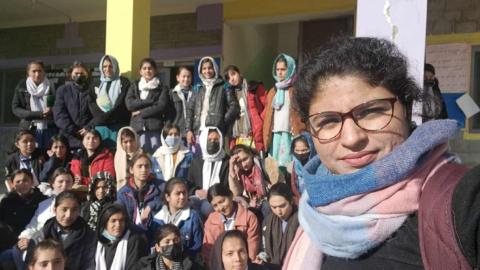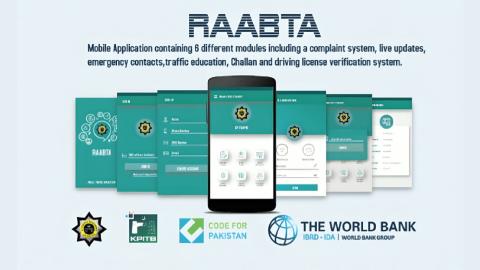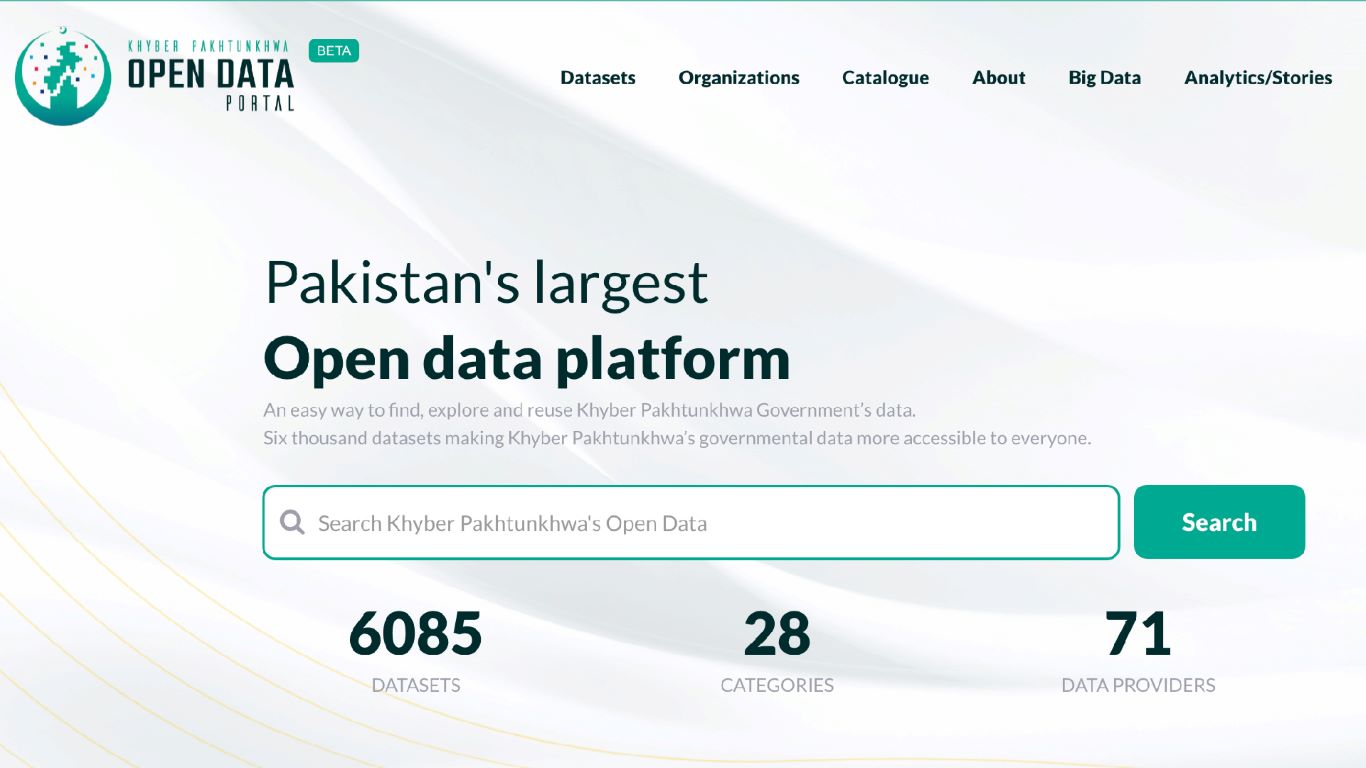The KP Fellowship is Khyber Pakhtunkhwa IT Board (KPITB) and Code for Pakistan’s (CfP) collaborative initiative that aims to bring technological revolution in Khyber Pakhtunkhwa by connecting government departments with technologists, researchers, and designers to support KP’s digital transformation.
Each year, the KP Government Innovation Fellowship program brings together local techies, designers, and developers for a period of six months to devise solutions aimed at improving service delivery in government departments. Some of the solutions developed by the KP fellows include:
- A Pharmaceutical License Digitization Initiative transformed the pharmacy license creation and renewal processes for the Directorate of Health KP. Since its launch in 2021, over 21,000 licenses have been issued digitally.
- The PSRA E-Registration System, developed for the Private Schools Regulatory Authority, has facilitated the online registration of 9,000 schools across KP, with 5,849 schools renewing their registration since its launch in 2019.
- The Raabta app for the KP Traffic Police Department enables citizens to stay informed about local traffic conditions, obtain information on how to create driving licenses, and verify licenses and challans. Since its launch, the app has received 50,000+ downloads.
- An Android app developed for the KP Food Safety and Halal Food Authority enables businesses to register online and allows citizens to rate and review food-related businesses.
Fellowship Program’s Model
The Fellowship is a 6 month mentored program where a cohort of 20 Fellows - with a background in technology, user research, product design and development, and digital marketing - are selected to collaborate with different government departments of KP to build digital services, inspire citizen engagement, and improve government processes.
The KP Fellowship Program revolves around four key features:
- Citizens and government working together, hand-in-hand, to solve problems
- Adopting user-centric, lean, and agile development methodologies
- Increasing civic engagement by creating innovative solutions in public services
- Developing open source software solutions

Program’s Curriculum
The Fellowship curriculum is inspired by Code for America’s Fellowship but has been adapted to KP’s context. The Fellows interact frequently with the Code for All community and exchange learnings on community engagement and civic tech.
There are three major focus areas of the curriculum
- Fellows and government departments working collaboratively
- Fellows get the opportunity to work with government departments, understand workflows and policies and play a critical role in developing digital solutions for the departments, while also working towards government innovation, and improving citizens & government interaction.
- Training and Mentoring Fellows
- The program focuses on training and mentoring of Fellows on technical skills and software development methodologies, and building familiarity with upcoming technologies. Fellows are also guided on choosing the right career path(s).
- Professional development and soft skill training
- The Fellowship includes coaching & mentoring sessions on entrepreneurial skills development, networking opportunities with industry experts & thought leaders, professional grooming, as well building their communication and other soft skills.
How the Problem Statements are collected
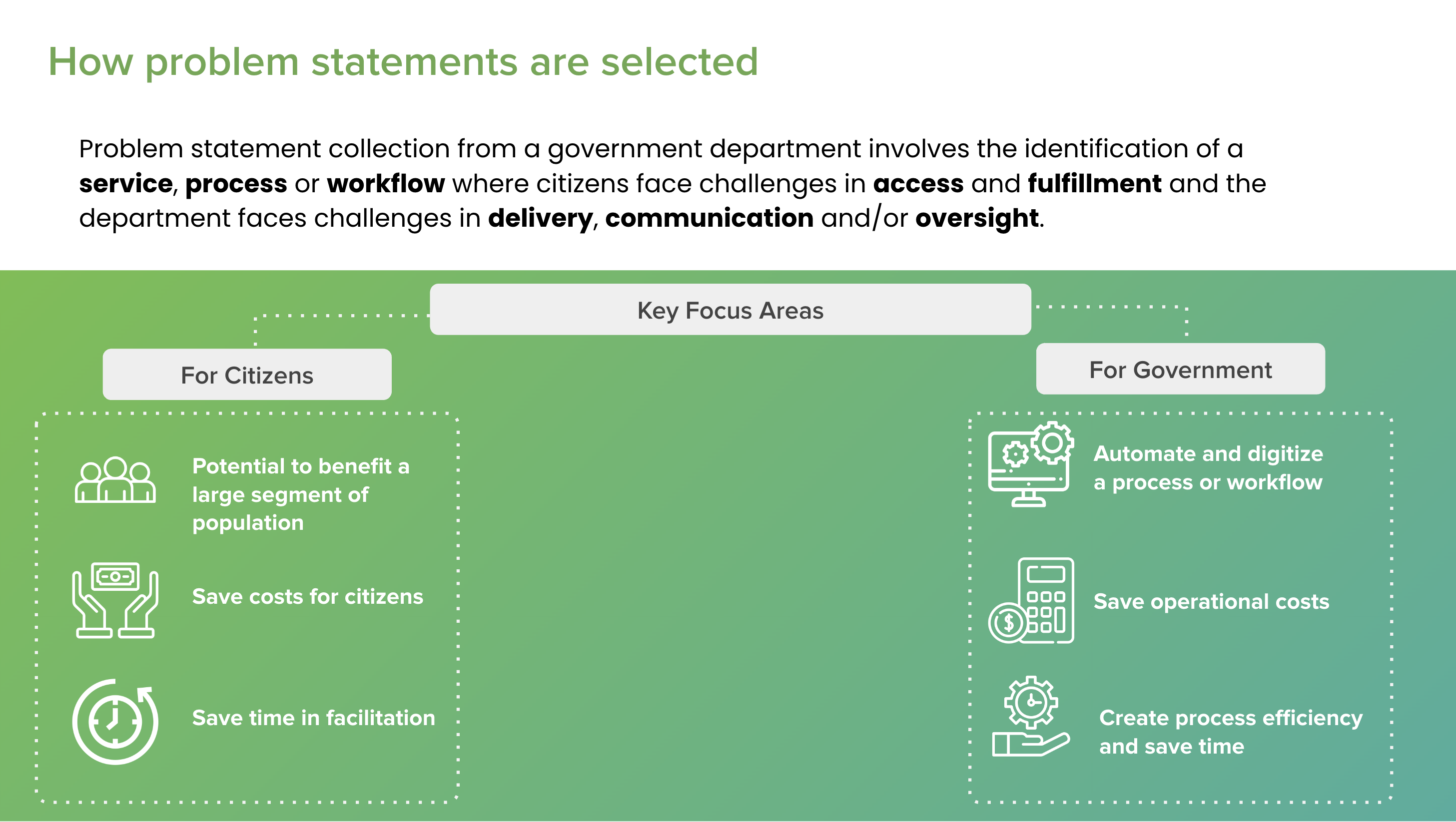
Before the commencement of each Fellowship cycle, problem statements are collected from different government departments. These problem statements are selected based on how specific technology can help improve governance and have a positive impact on improving citizen facilitation.
How the Fellows Develop Solutions
Once a problem statement has been selected, the Fellows start working on developing a solution. This is a consultative process where the government department focal persons and the Fellows collaboratively develop the most viable solution for the given problem.
The Fellows spend time interviewing users and stakeholders from the partnering departments, trying to determine the root causes and context of their problems, and then create user personas and map user journeys. Based on the learnings gathered from the first phase, the engineering teams work on creating digital solutions in sprints, which are tested with the stakeholders and continuously iterated. Once completed, the developed solutions are handed over to the concerned government departments where they are deployed and maintained regularly.
Alignment with KP Digital Strategy and Enterprise Architecture Framework
In alignment with KP's digital strategy, the goal of the Fellowship Program is to support digital transformation within the spheres of local government. The digital solutions developed under the program will focus on the key pillars of KP's Digital Strategy, namely Digital Access and Digital Governance.
Additionally, in accordance with the KP Enterprise Architecture Framework (KPEAF), which is a comprehensive framework developed to support Khyber Pakhtunkhwa's digital transformation, we will adhere to governance principles with a structured approach, aligning with the government's vision of enhanced service delivery, transparency, and accountability through digital governance.
Under the Fellowship Program, our goal is to implement information technology solutions across public sector organizations, creating a paperless governance environment and an online One-Stop-Shop (OSS) model for all functional domains of the government, including:
- Government to Citizens (G2C)
- Government to Businesses (G2B)
- Government to Government (G2G)
- Government to Employees (G2E)
Our aim is to leverage digital data and technologies for cohesive service transformation through collaboration and data sharing. The solutions developed under the KP Fellowship program will be open, secure, interoperable, proactive, user-driven, and data-driven, ensuring effective public service delivery.
Fellowship Timeline
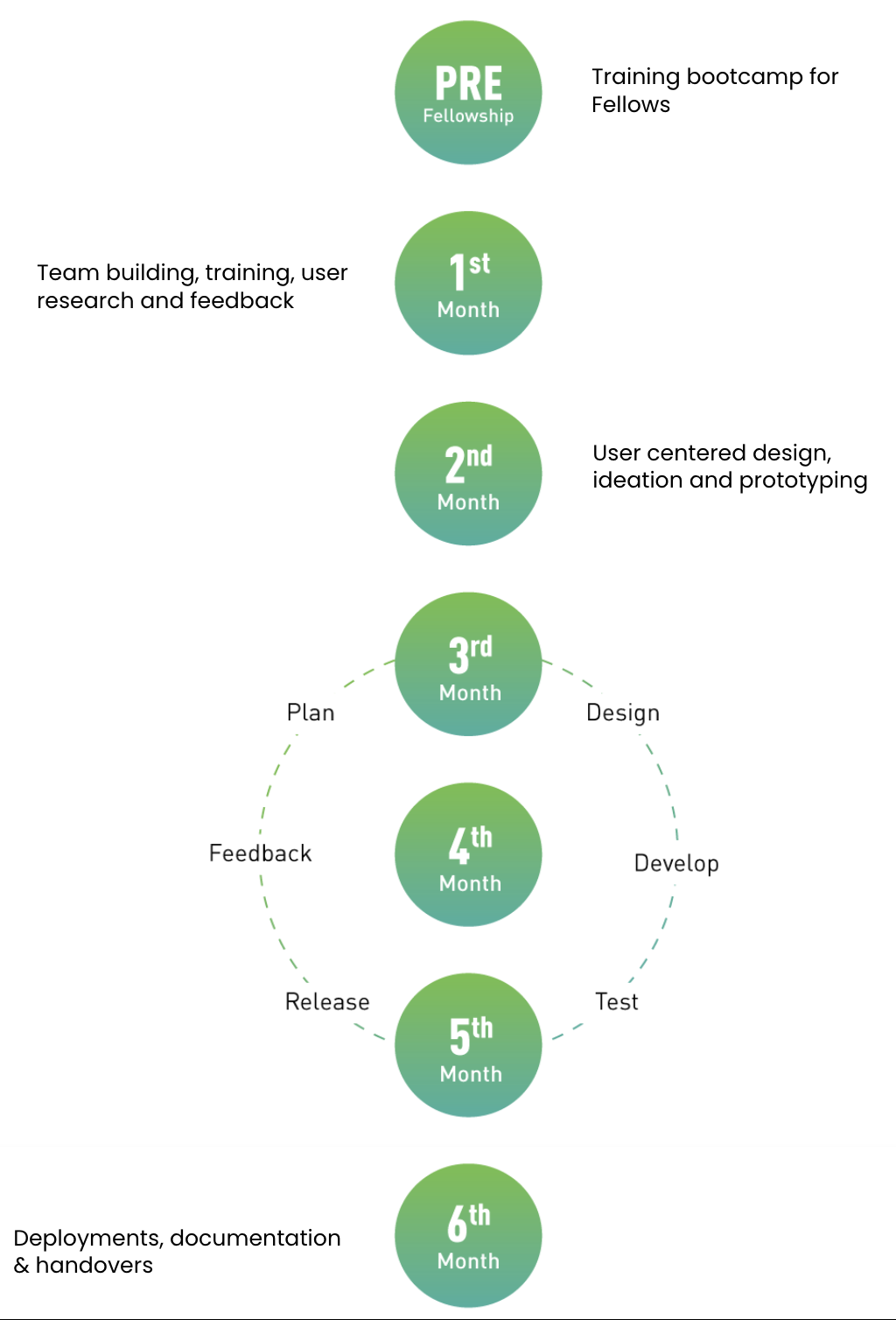
How the Program Benefits the Government
The program builds capacity, increases efficiency, promotes transparency, and enhances accountability within the government while also facilitating the public to access these services seamlessly. The services designed during the Fellowship are user-centric, keeping the user needs at the heart of service design.
Citizens are considered as an integral part of the process and the Fellows interview them after each sprint and continuously incorporate their feedback. By following this process, the services designed have been found to be more effective, giving the stakeholders a sense of ownership and opening new avenues for building innovative services. The user research also opens feedback loops between government and citizens, builds trust in public services and leads to higher project adoption rates within government.
Fellows also benefit directly from the program. Fellows are given a monthly remuneration for six months, professional mentorship, free workspace, leadership development training, and above all a chance to work with a government department to improve their public service delivery. After graduation, these Fellows are also linked with various public, private, and international organizations for better employment opportunities.
Program’s Impact
The Fellowship Program was inspired by Code for America’s Fellowship Program but was redesigned to adapt to the local setting. This program has been running for the past 9 years with streamlined processes and is ready to be piloted in other provinces immediately.
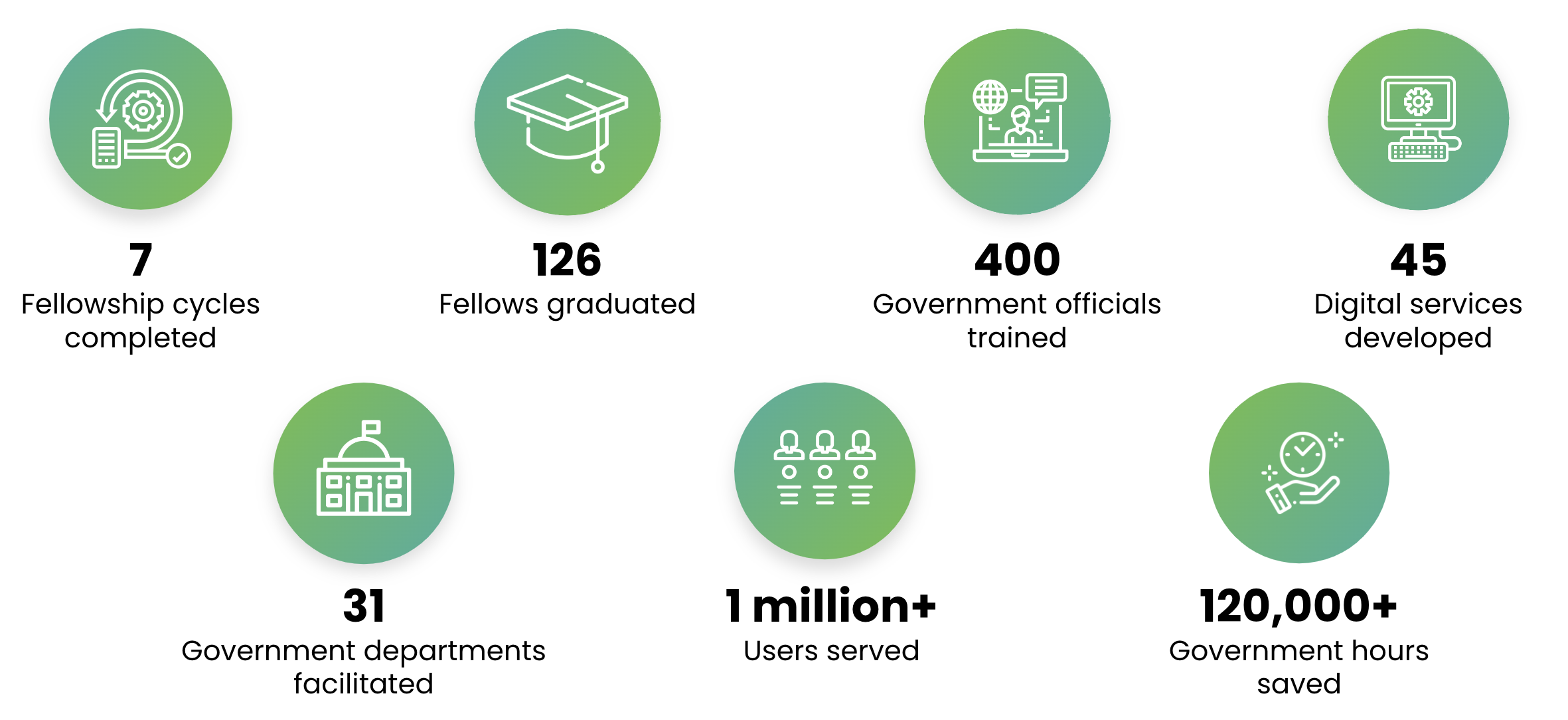
Since the program’s inception in 2014, 126 Fellows (among them are 28 Female Fellows) have graduated, creating 45 digital solutions for 31 government departments. We grew together from having 12 Fellows in the first year to 20 part-time Fellows by the second year and 20 full-time Fellows from 3rd to the 9th year.
Since launch, the digital solutions developed under the program have served over 1 million users. These solutions have also helped save 120,000+ government hours increasing efficiency and promoting transparency in the partnering government departments.
